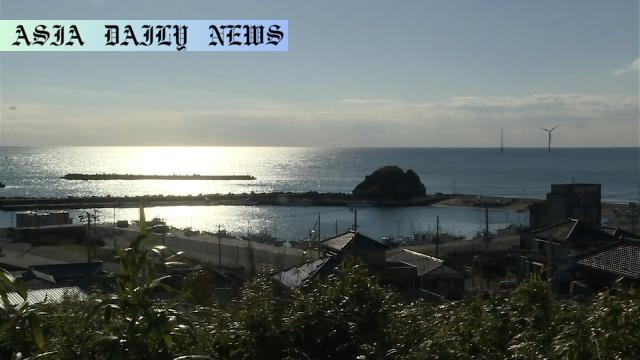Offshore Wind Power: A coastal city in Japan struggles to secure its offshore wind project after Mitsubishi reviews its viability.
- The city of Choshi, Japan, is pushing to save its offshore wind power project after Mitsubishi Corporation’s review.
- The project was planned to begin by 2028 but faces rising costs, jeopardizing its outlook.
- A $33M investment for a port and associated developments are at stake.
- Choshi Mayor has urged the central government to continue supporting the initiative.

Introduction to the Offshore Wind Power Project
The city of Choshi, located along the Pacific coast of Japan’s Chiba Prefecture, has been a pioneer in pursuing renewable energy initiatives. Its ambitious plan to establish an offshore wind power generation facility appeared to offer a sustainable solution for the growing energy demands in the region. However, recent developments have put this project into uncertainty as one of the main operators, Mitsubishi Corporation, has announced plans to reevaluate the venture due to escalating costs.
Background and Original Vision for the Project
Choshi City, alongside other stakeholders including Mitsubishi Corporation, Chubu Electric Power Company, and local cooperatives, had envisioned the wind power project as a pivotal addition to their economy. Initially planned for operation by 2028, the facility was poised to become a major contributor to the city’s industrial landscape, second only to its robust fisheries sector. A specialized joint venture was formed to oversee the project’s execution, including turbine maintenance and workforce development. This marked an important step in Japan’s broader goal of reducing carbon emissions and expanding its renewable energy infrastructure.
Challenges Faced: A Financial Roadblock
The announcement by Mitsubishi Corporation to review the plan’s viability, citing surging costs, has cast a shadow over the project. Offshore wind farms often involve significant financial expenditure for equipment, installation, and maintenance, but the current global economic climate and rising material costs have exacerbated challenges. Local governments and entities directly involved in the venture are now scrambling to find a way to salvage the initiative.
Economic Implications for Choshi City
The financial implications of halting this project are substantial for Choshi City. Approximately 5 billion yen (around 33 million dollars) had been slated for associated infrastructure, such as a port to be used for turbine maintenance. This port is already under construction, and its future utility depends heavily on the continuity of the wind power project. Mayor Koshikawa Shinichi expressed grave concerns over the inability to recoup the city’s investment if the project is shelved entirely, emphasizing its potentially significant economic impact.
Stakeholders’ Responses and Plans
The local government, fisheries cooperative, and chamber of commerce have remained steadfast in their commitment to the project. Efforts are now focused on persuading the Japanese central government, as well as private operators, to ensure the continuation of the offshore wind initiative. Leaders in Choshi have called for financial support and alternative strategies to adapt to the rising costs without abandoning the project altogether. Additionally, the joint venture company is highlighting the value of renewable energy as a long-term benefit that outweighs short-term financial setbacks.
Importance of Offshore Wind Power Generation
From a global perspective, offshore wind power is widely regarded as a sustainable solution for energy demands. Japan, with its limited natural resources and dependence on imported energy, has every reason to prioritize the development of renewable energy infrastructures. This initiative in Choshi could serve as a blueprint for future projects in the nation, potentially boosting energy self-reliance and mitigating climate change.
The Path Forward
While the future of the Choshi offshore wind power project remains uncertain, it is clear that its success relies on collaboration between stakeholders, financial adjustments, and innovative problem-solving. Local officials and residents are advocating strongly to advance the project, reflecting the broader need for renewable energy expansion in Japan and worldwide. It is hopeful that with sufficient government intervention and financial recalibration, this initiative could still come to fruition.



Commentary
The Significance of Renewable Energy Projects
Renewable energy initiatives like Choshi’s offshore wind power project highlight an important step forward in addressing climate change and diversifying energy sources. In today’s era, where the effects of fossil fuel dependency are becoming increasingly evident, projects such as this stand as pillars of hope for a cleaner, greener future. Choshi’s ambitious plans embody more than just an economic opportunity; they represent a shift in societal priorities towards sustainable development.
Challenges in Scaling Sustainable Solutions
The challenges faced by the Choshi project underscore the complexities intrinsic to renewable energy ventures. While the benefits of wind power are undeniable, the upfront costs associated with infrastructure and equipment often become deterrents. This scenario isn’t exclusive to Japan; it serves as a universal reminder of the financial barriers that sustainability still faces, despite its long-term advantages. Governments and private sectors must work hand-in-hand to provide the necessary support for such initiatives to thrive.
Looking Towards a Collaborative Future
The community’s resilience and determination to salvage Choshi’s wind power project are inspiring. This case serves as a crucial learning opportunity for stakeholders across industries. By fostering collaboration, understanding market dynamics, and finding innovative solutions to financial setbacks, the potential of renewable energy can be fully realized. The hope is that this project does not become another lost opportunity but instead turns into a catalyst for more robust policies and future investments in green energy.